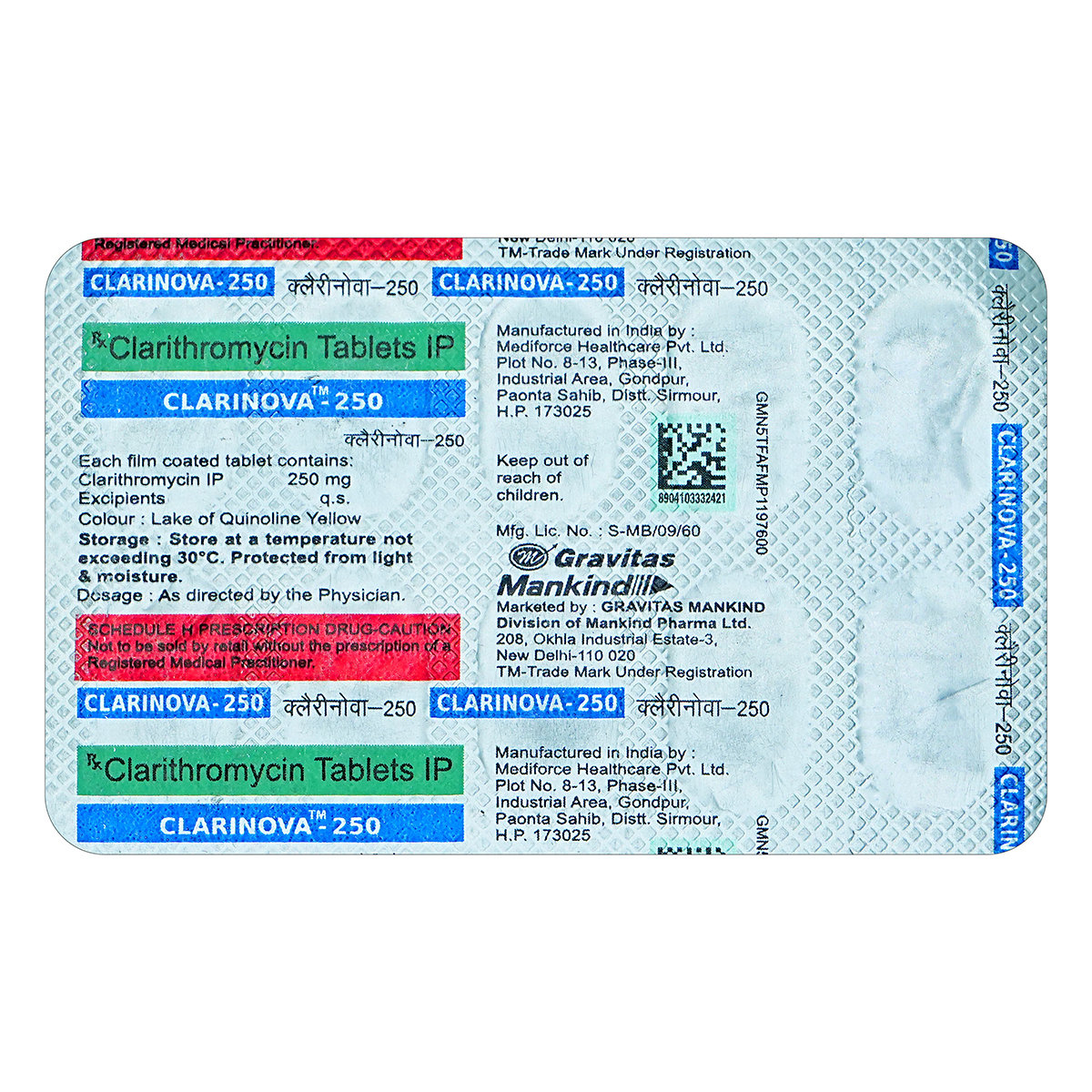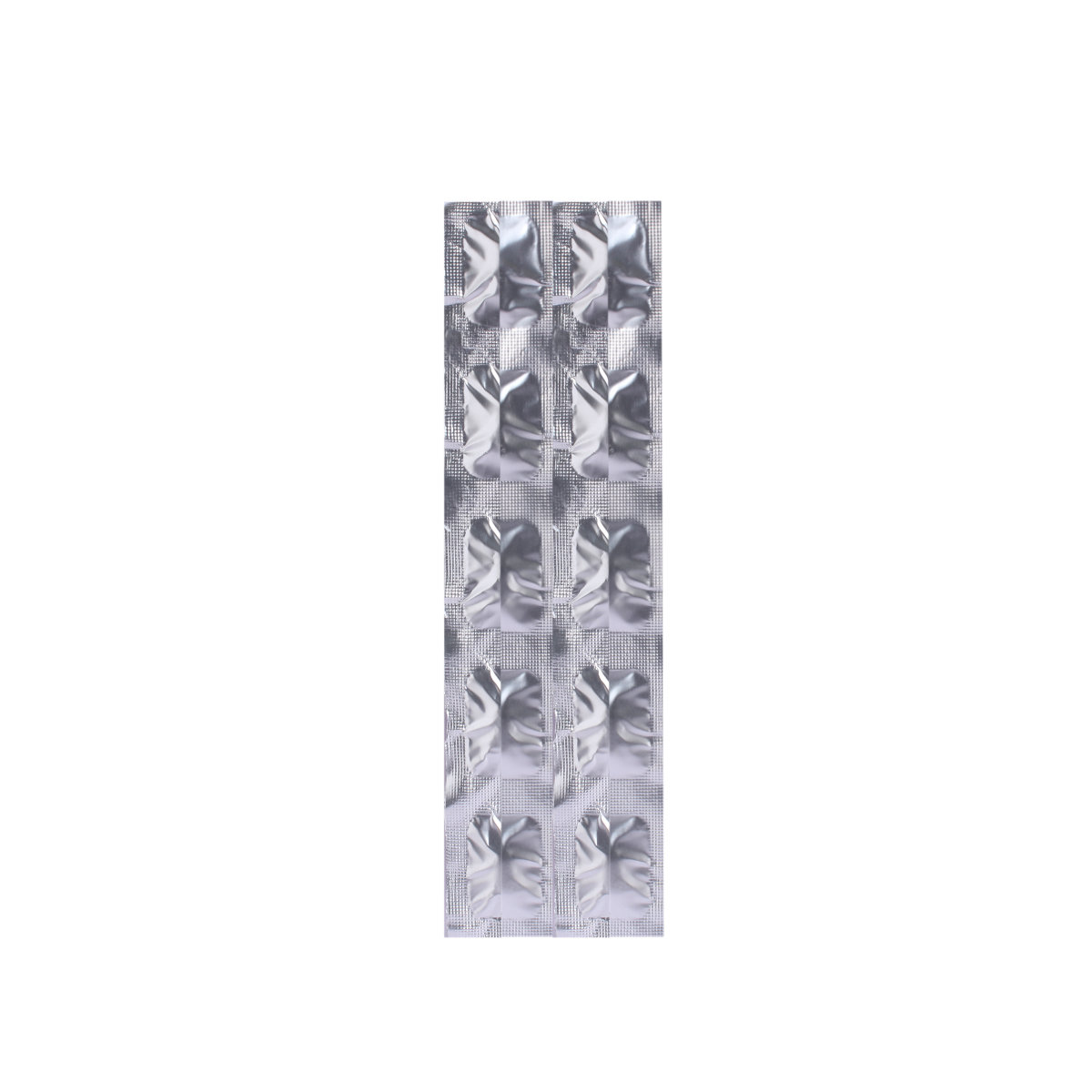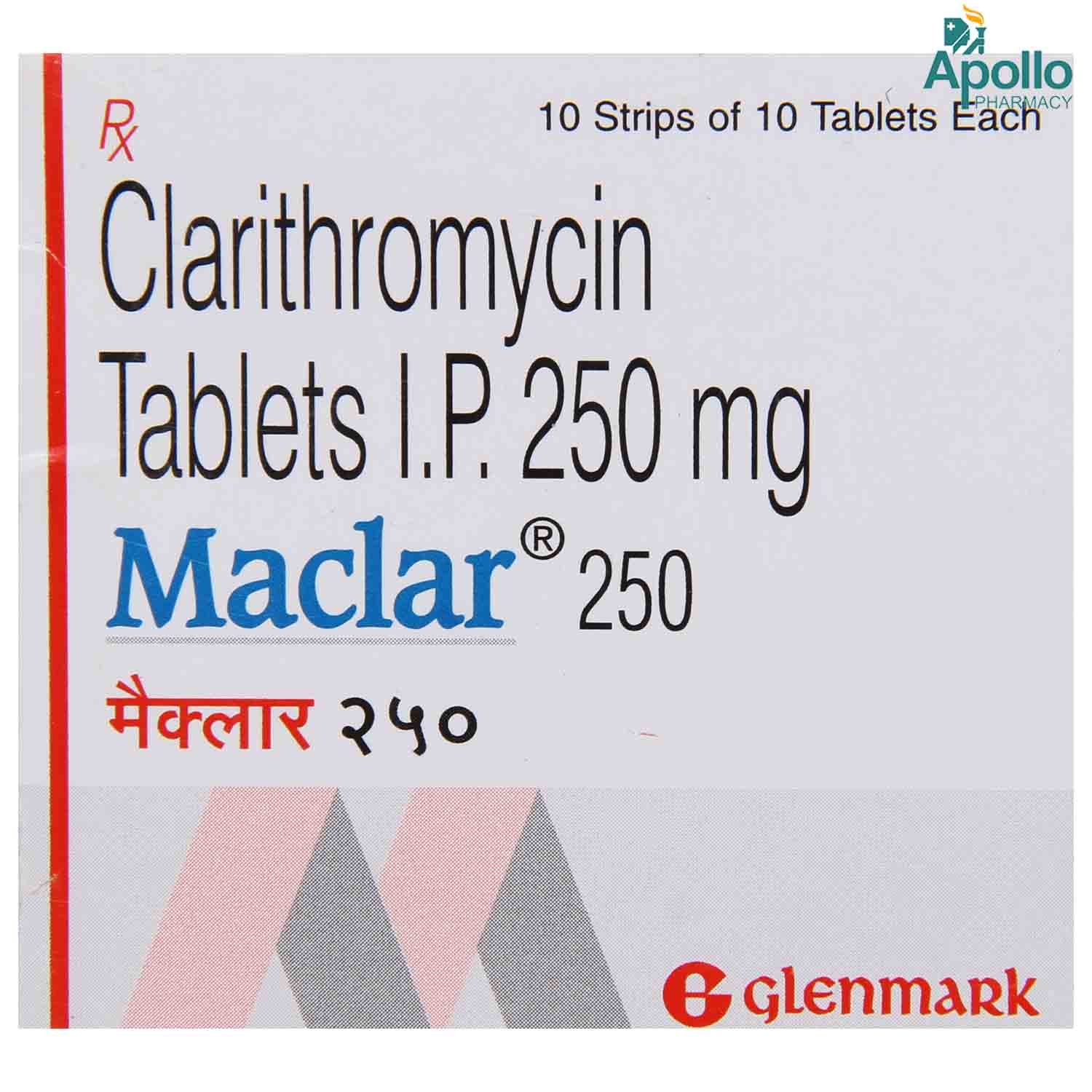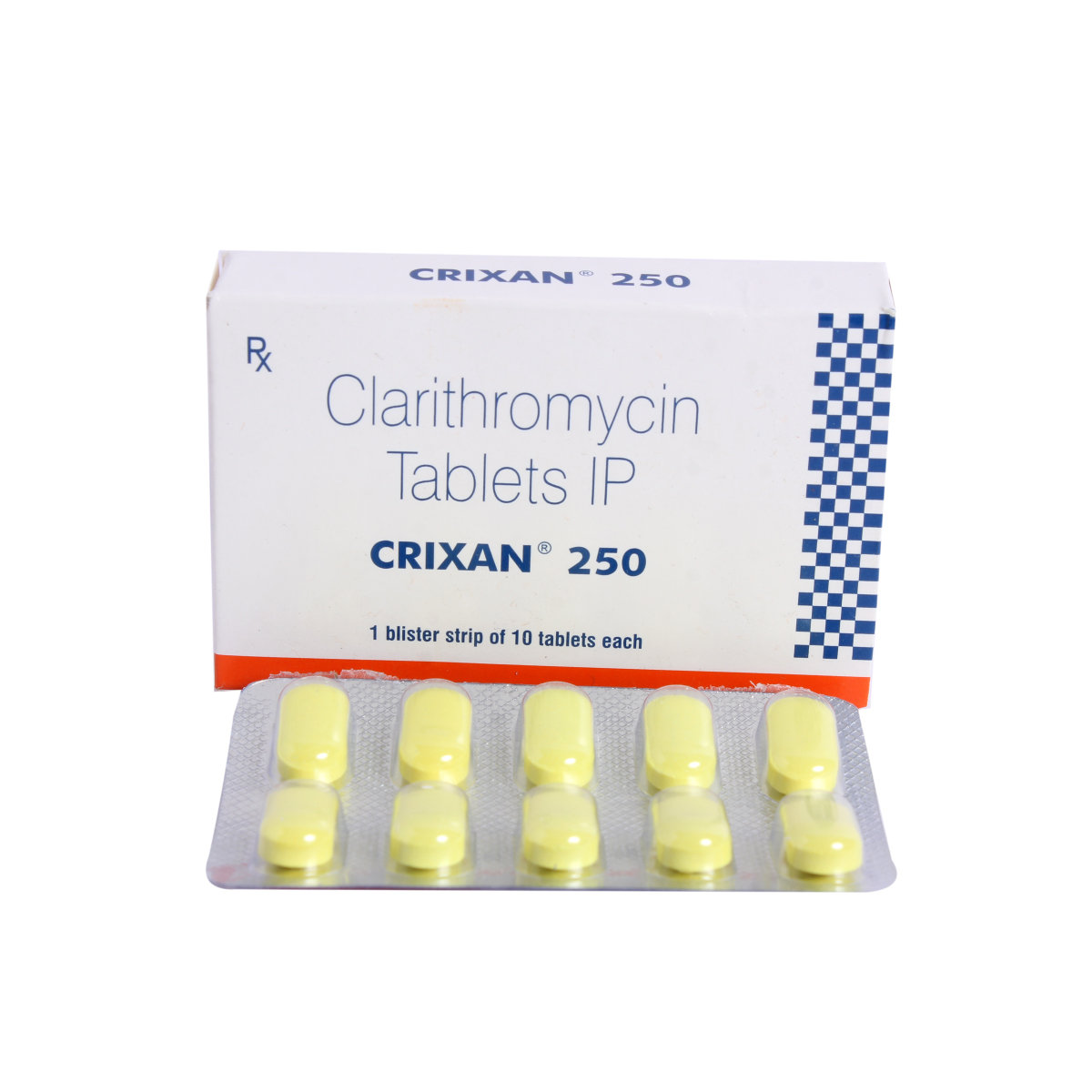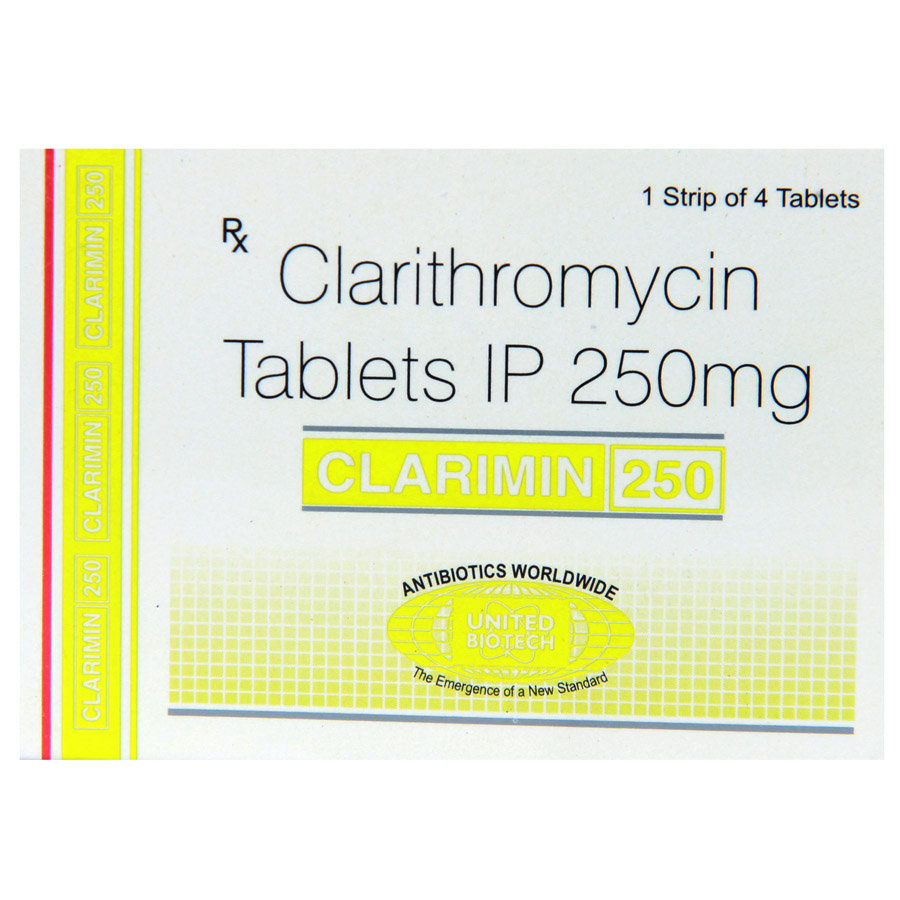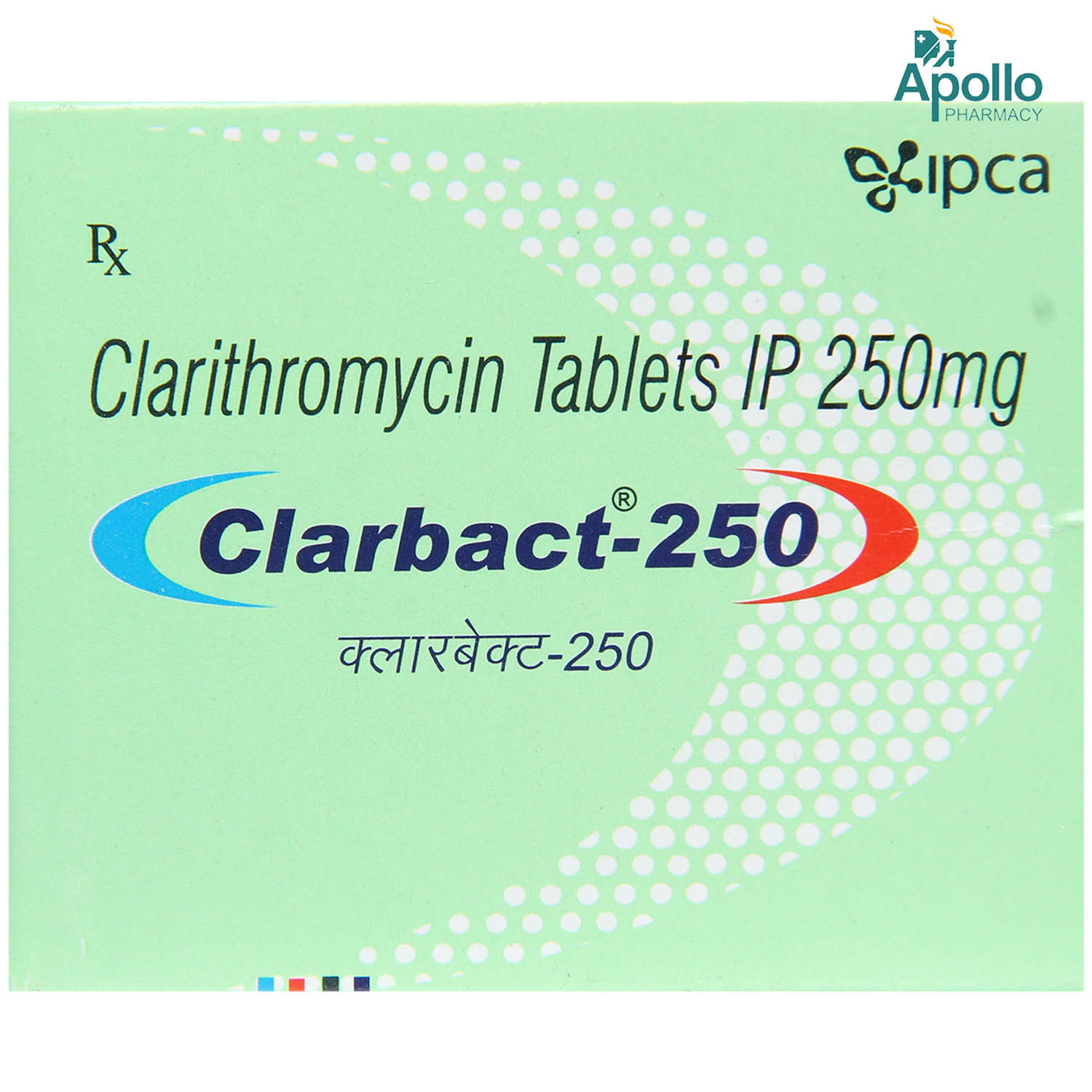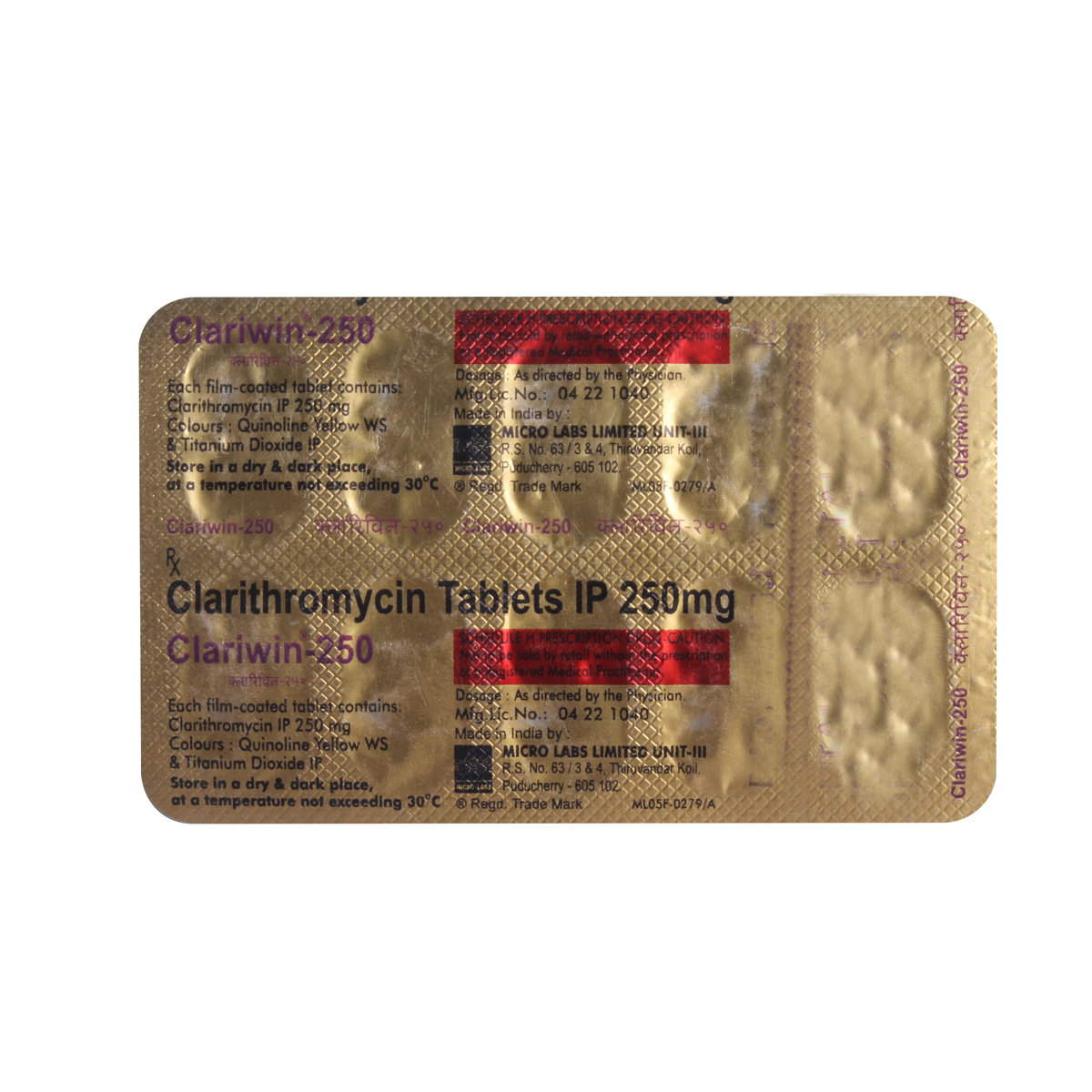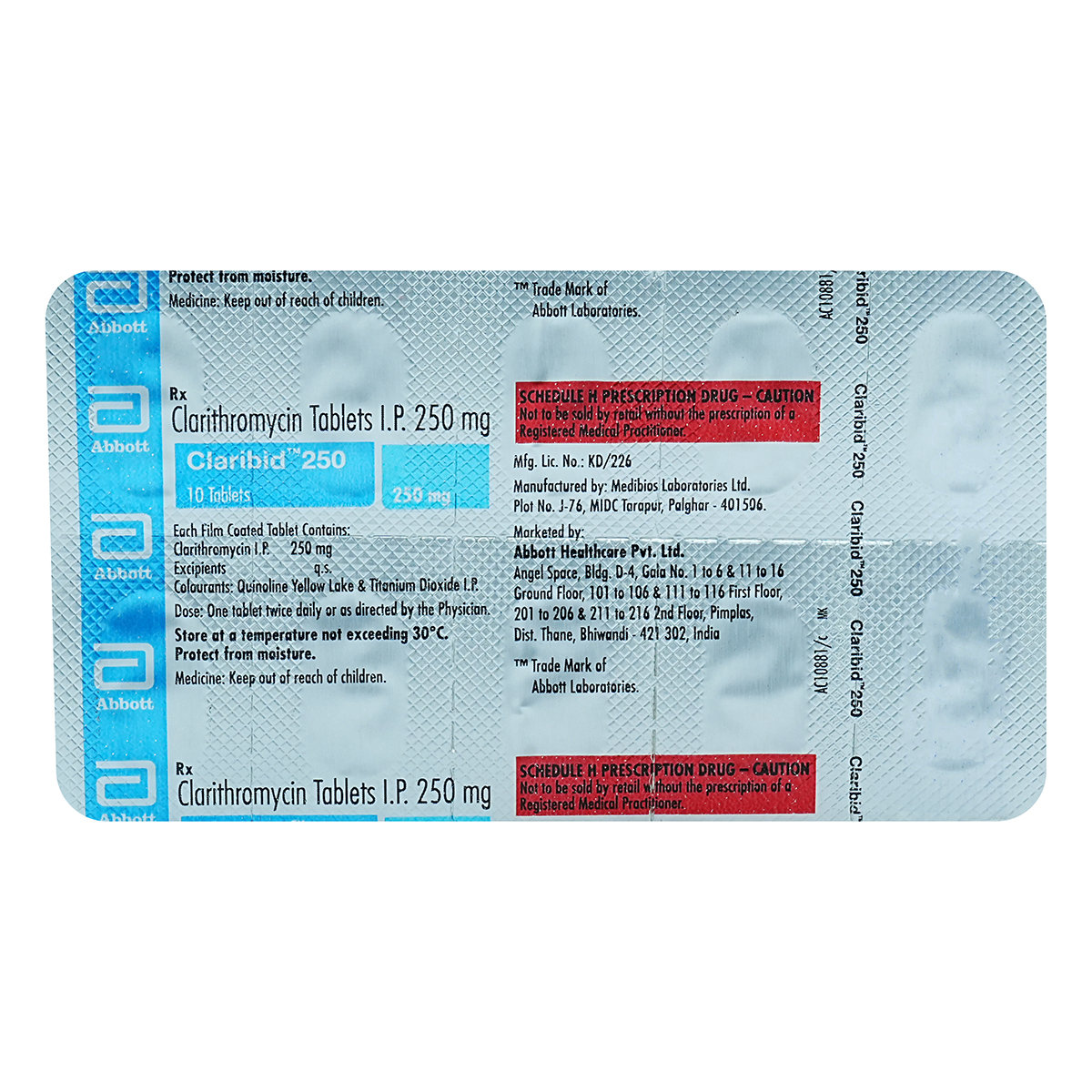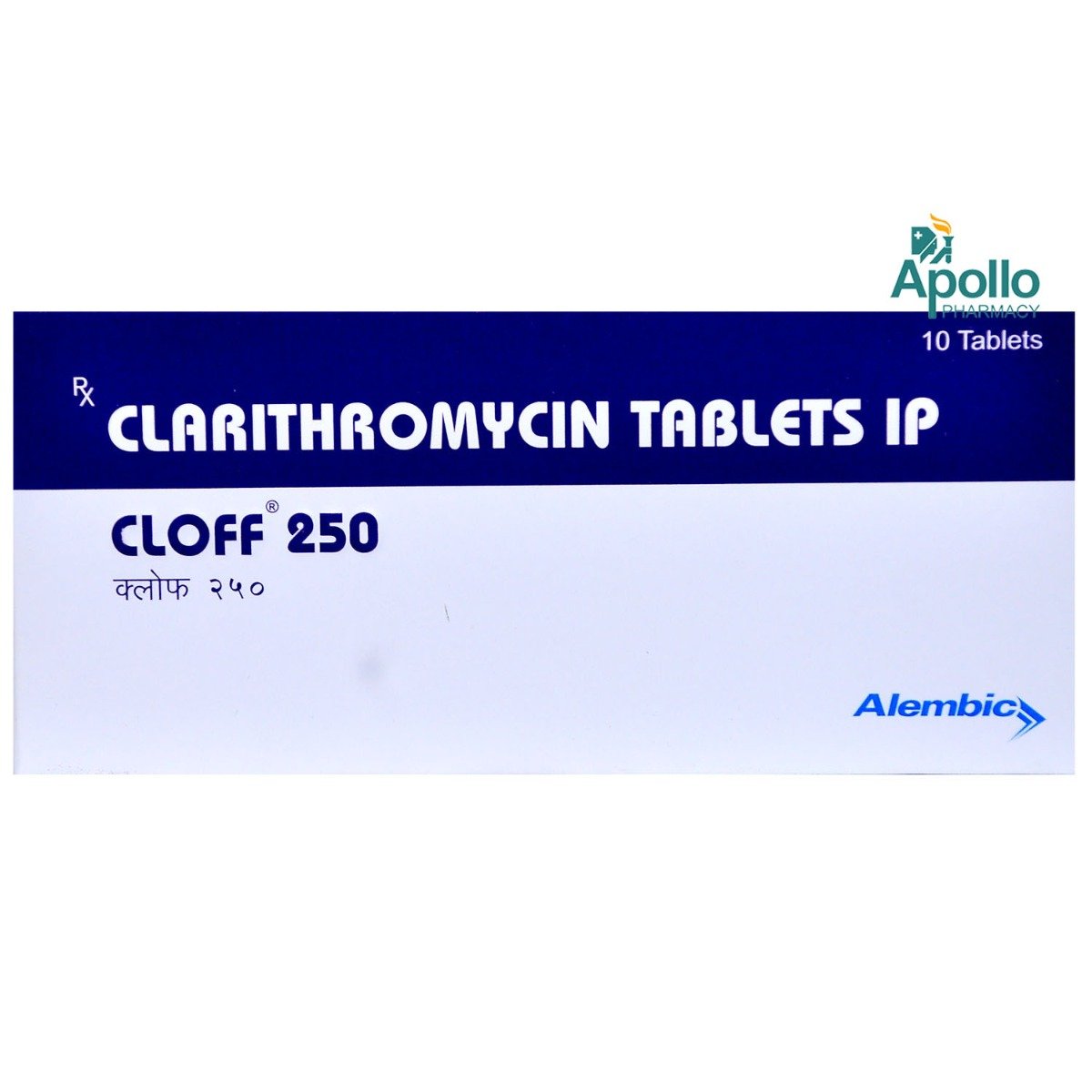Biomycin-250 Tablet 4's
MRP ₹95.46
(Inclusive of all Taxes)
₹14.3 Cashback (15%)
Provide Delivery Location
Online payment accepted
 Prescription drug
Prescription drugWhats That
Composition :
Manufacturer/Marketer :
Consume Type :
Return Policy :
About Biomycin-250 Tablet 4's
Biomycin-250 Tablet 4's belongs to a group of medicine called macrolide antibiotics derived from Saccharopolyspora erythraea (originally called Streptomyces erythreus), used to treat a wide range of bacterial infections, including chest infections such as bronchitis and pneumonia, skin problems such as cellulitis (potentially serious bacterial skin infection. The affected skin appears swollen and red and is typically painful and warm to the touch), and ear infections. Besides this, Biomycin-250 Tablet 4's is also used in combination with other medicines to treat duodenal ulcers caused by H. pylori. A bacterial infection is a condition in which bacteria grow in the body and cause infection. It can target any body part and multiple very quickly. Antibiotics inhibit the growth of microorganisms given to treat such kinds of conditions.
Biomycin-250 Tablet 4's contains Clarithromycin (antibiotic). It inhibits the protein synthesis process required for the growth of the bacterial cell. As a result, bacterial cells are not able to reproduce and grow. Thus, Biomycin-250 Tablet 4's helps in the prevention of infections.
Biomycin-250 Tablet 4's should only be if your doctor has prescribed you. Biomycin-250 Tablet 4's should not be stopped even if you feel better as it is an antibiotic medication, and completing the full course if very necessary; otherwise, the infection might re-appear in a more severe form. Like all medicines, Biomycin-250 Tablet 4's may cause some common side effects, including feeling sick (nausea), diarrhoea and being sick (vomiting), losing your appetite, bloating and indigestion, headaches and difficulty sleeping. These side effects are temporary and may get resolve after some time; however, if this side persists, let your doctor know about this if you notice any sudden wheeziness, tightness in the chest or throat, difficulty in breathing, swelling of the eyelids, face or lips, rash or itching (especially affecting your whole body) STOP TAKING your medicine and go to a doctor immediately.
Do not take Biomycin-250 Tablet 4's if allergic to azithromycin, other macrolide antibiotics, or any components present in Biomycin-250 Tablet 4's. Biomycin-250 Tablet 4's isn't normally recommended during pregnancy and while breastfeeding. But your doctor may prescribe it if the benefits of you taking it are greater than the risks. Do not consume alcohol as it may cause excessive drowsiness when taken along with Biomycin-250 Tablet 4's. Before using the Biomycin-250 Tablet 4's, tell your doctor if you ever had an allergy to Biomycin-250 Tablet 4's have kidney problems, liver problems, swollen food pipe (oesophagitis), lupus disease (an autoimmune disease), or muscle disease (myasthenia gravis). Do not drink alcohol with Biomycin-250 Tablet 4's as it may increase the unpleasant side effects like drowsiness and dizziness.
Uses of Biomycin-250 Tablet 4's
Directions for Use
Key Benefits
Biomycin-250 Tablet 4's is a type of macrolide class of antibiotic which is effective against a wide range of bacteria, including gram-negative, gram-positive bacteria, anaerobes, and some parasites (like Balantidium coli and Entamoeba species). It is prescribed for treating various bacterial infections including chest infections such as pneumonia, skin problems such as cellulitis, and ear infections; on the other hand, It is also used in combination with other medicines to treat duodenal ulcers caused by H. pylori (Helicobacter pylori). Biomycin-250 Tablet 4's is sometimes used by people who have an allergy to penicillin and antibiotics similar to penicillin, such as amoxicillin.
Storage
- Drink plenty of fluids and consider oral rehydration solutions.
- Eat bland, easily digestible foods like bananas, rice, toast, and applesauce.
- Avoid trigger foods like greasy, spicy, fatty, acidic, and caffeinated foods.
- Gradually reintroduce fiber-rich foods as symptoms improve.
- Get adequate sleep and rest.
- Practice relaxation techniques to manage stress.
- Maintain regular bowel habits.
- Avoid overexertion and take breaks when needed.
- Consult a doctor if your gastrointestinal symptoms are severe, persistent, or accompanied by fever, bloody stools, dehydration, or last for more than a few days.
- Regularly brush and floss your teeth.
- Rinse your mouth with water and baking soda a solution to neutralize acid in the mouth. This makes your food taste as it should.
- Drink plenty of water or non-caffeinated drinks to prevent dry mouth which may lead to altered taste.
- Try ginger, peppermint, fruit or green teas, lemonade, ginger ale or fruit juice to help mask unpleasant tastes.
- Try sucking on sugar-free ice pops or ice cubes to prevent dry mouth.
- Inform Your Doctor: Notify your doctor immediately about your diarrhoea symptoms. This allows them to adjust your medication or provide guidance on managing side effects.
- Stay Hydrated: Drink plenty of fluids to replace lost water and electrolytes. Choose water, clear broth, and electrolyte-rich drinks. Avoid carbonated or caffeinated beverages to effectively rehydrate your body.
- Follow a Bland Diet: Eat easy-to-digest foods to help firm up your stool and settle your stomach. Try incorporating bananas, rice, applesauce, toast, plain crackers, and boiled vegetables into your diet.
- Avoid Trigger Foods: Steer clear of foods that can worsen diarrhoea, such as spicy, fatty, or greasy foods, high-fibre foods, and dairy products (especially if you're lactose intolerant).
- Practice Good Hygiene: Maintain good hygiene to prevent the spread of infection. To stay healthy, wash your hands frequently, clean and disinfect surfaces regularly, and avoid exchanging personal belongings with others.
- Take Anti-Diarrheal Medications: If your doctor advises, anti-diarrheal medications such as loperamide might help manage diarrhoea symptoms. Always follow your doctor's directions.
- Keep track of your diarrhoea symptoms. If they don't get better or worse or are accompanied by severe stomach pain, blood, or dehydration signs (like extreme thirst or dark urine), seek medical help.
- Inform your doctor about the nausea and discuss possible alternatives to the medication or adjustments to the dosage.
- Divide your daily food intake into smaller, more frequent meals to reduce nausea.
- Opt for bland, easily digestible foods like crackers, toast, plain rice, bananas, and applesauce.
- Avoid certain foods that can trigger nausea, such as fatty, greasy, spicy, and smelly foods.
- Drink plenty of fluids, such as water, clear broth, or electrolyte-rich beverages like coconut water or sports drinks.
- Use ginger (tea, ale, or candies) to help relieve nausea.
- Get adequate rest and also avoid strenuous activities that can worsen nausea.
- Talk to your doctor about taking anti-nausea medication if your nausea is severe.
- Record when your nausea occurs, what triggers it, and what provides relief to help you identify patterns and manage your symptoms more effectively.
- Preventing Vomiting (Before it Happens)
- Take medication exactly as prescribed by your doctor. This can help minimize side effects, including vomiting.
- Having a small meal before taking your medication can help reduce nausea and vomiting.
- Talk to your doctor about taking anti-nausea medication along with your prescribed medication.
- Managing Vomiting (If it Happens)
- Try taking ginger in the form of tea, ale, or candy to help alleviate nausea and vomiting.
- What to Do if Vomiting Persists
- Consult your doctor if vomiting continues or worsens, consult the doctor for guidance on adjusting your medication or additional treatment.
- Drink water or other clear fluids.
- To prevent worsening of pain, limit intake of tea, coffee, or alcohol.
- Include bland foods like rice, toast, crackers, and rice in your diet.
- Avoid lying down immediately after eating as it may cause indigestion or heartburn.
- Avoid acidic and spicy food as it may cause indigestion.
- Skin rash caused by allergies is due to irritants or allergens. Therefore, avoid contact with such irritants.
- Consult your doctor for proper medication and apply an anti-itch medication. Follow the schedule and use the medication whenever needed.
- Protect your skin from extreme heat and try to apply wet compresses.
- Soak in the cool bath, which gives a soothing impact to the affected area.
Drug Warnings
Iron and antacid (like magnesium hydroxide and aluminium hydroxide) may bind to Biomycin-250 Tablet 4's in the gastrointestinal tract, lowering its efficiency. So, a gap of at least 2 hours should be maintained between intake of Biomycin-250 Tablet 4's and iron supplements and antacids. Besides this, in some cases, the use of Biomycin-250 Tablet 4's causes antibiotic-associated diarrhoea. Biomycin-250 Tablet 4's may cause sensitive skin to sunlight and ultraviolet rays, causing an exaggerated sunburn reaction. Hence it is advisable to apply sunscreen before going outside. Its use has also been associated with an increased risk of fungal skin infections like (vaginal candidiasis - thrush). Tetracycline and Biomycin-250 Tablet 4's can form a stable calcium complex in bone-forming tissue, thereby affecting the growth of fibula bones in young children and bone development in the foetus. Using a Biomycin-250 Tablet 4's with isotretinoin should be avoided as it has been reported to cause pseudotumor cerebri (increased pressure inside the brain). Long-term use of Biomycin-250 Tablet 4's may affect your blood, kidney, and liver health, so yearly diagnostics test of these parameters is recommended.
Drug-Drug Interactions
Drug-Drug Interactions
Login/Sign Up
Taking Biomycin-250 Tablet with Lovastatin can increase the risk of muscle problems.
How to manage the interaction:
Co-administration of Biomycin-250 Tablet and Lovastatin can lead to an interaction, it can be taken if advised by a doctor. However, if you experience any symptoms like fever, chills, joint pain or swelling, unusual bleeding or bruising, skin rash, itching, loss of appetite, fatigue, nausea, vomiting, dark-colored urine, and/or yellowing of the skin or eyes, consult a doctor immediately. Do not stop using any medications without a doctor's advice.
Taking Rifabutin and Biomycin-250 Tablet together may increase the blood levels of rifabutin.
How to manage the interaction:
Taking Rifabutin with Biomycin-250 Tablet is not recommended as it can possibly result in an interaction, it can be taken if a doctor has advised it. However, consult a doctor immediately If you experience unusual symptoms. Do not discontinue any medications without consulting a doctor.
When Quinidine is taken with Biomycin-250 Tablet, can increase the blood levels and effects of Quinidine. This may increase the risk of an irregular heart rhythm.
How to manage the interaction:
Co-administration of Biomycin-250 Tablet and Quinidine can lead to an interaction, it can be taken if advised by a doctor. You should seek immediate medical attention if you develop sudden dizziness, lightheadedness, fainting, shortness of breath, or fast or pounding heartbeats. However, if you experience any symptoms like headache, confusion, vomiting, diarrhea, ringing in the ears, hearing loss, blurred or double vision, or sensitivity to light, consult a doctor immediately. Do not stop using any medications without a doctor's advice.
When Nimodipine is taken with Biomycin-250 Tablet, it can increase the risk of side effects.
How to manage the interaction:
Co-administration of Biomycin-250 Tablet and Nimodipine is not recommended as it can lead to an interaction, it can be taken if advised by a doctor. However, if you experience any symptoms like irregular heart rhythm, swelling, and low blood pressure, consult a doctor immediately. Do not stop using any medications without a doctor's advice.
When Terfenadine is taken with Biomycin-250 Tablet, the amount of Terfenadine in the blood can go up.
How to manage the interaction:
Co-administration of Biomycin-250 Tablet and Terfenadine can lead to an interaction, it can be taken if advised by a doctor. However, if you experience any symptoms like dizziness, lightheadedness, fainting, shortness of breath, or heart palpitations, consult a doctor immediately. Do not stop using any medications without a doctor's advice.
Taking Biomycin-250 Tablet with Ziprasidone can increase the risk of irregular heart rhythm.
How to manage the interaction:
Co-administration of Biomycin-250 Tablet and Ziprasidone can lead to an interaction, it can be taken if advised by a doctor. However, if you experience any symptoms like dizziness, lightheadedness, fainting, shortness of breath, or heart palpitations, consult a doctor immediately. Do not stop using any medications without a doctor's advice.
When Biomycin-250 Tablet is taken with Conivaptan, it can lower the rate at which Conivaptan is broken down in the body.
How to manage the interaction:
Taking Biomycin-250 Tablet with Convivaptan can result in an interaction, it should be taken only if a doctor has advised it. However, if you experience swallowing, trouble speaking, muscle weakness, trouble controlling body movements, confusion, mood changes, or seizures, contact a doctor immediately. Do not discontinue any medications without consulting a doctor.
Co-administration of Eplerenone and Biomycin-250 Tablet may significantly increase the blood levels and effects of eplerenone.This may increase the risk or severity of side effects like high blood potassium which can lead to kidney damage and irregular heart rate.
How to manage the interaction:
Taking Biomycin-250 Tablet with Eplerenone is not recommended as it can lead to interaction. However, it can be taken if a doctor advises it. If you experience any unusual symptoms like headaches, irritation, confusion, edema (swelling caused by too much fluid accumulation), weakness, palpitations, or constipation, consult a doctor immediately. Do not stop using any medications without the Doctor's advice.
Combining Biomycin-250 Tablet with Pimozide can increase the risk of heart rhythm problems.
How to manage the interaction:
Co-administration of Biomycin-250 Tablet and Pimozide can lead to an interaction, it can be taken if advised by a doctor. However, if you experience any symptoms like irregular heartbeat, chest tightness, blurred vision or nausea, consult a doctor immediately. Do not stop using any medications without a doctor's advice.
When Alfuzosin and Biomycin-250 Tablet can increase the risk or severity of side effects like low blood pressure or irregular heart rates.
How to manage the interaction:
Taking Biomycin-250 Tablet with alfuzosin is not recommended as it can result in an interaction; it should be taken only if your doctor has advised it. However, if you experience dizziness, headache, palpitations, or chest discomfort, contact your doctor immediately. Do not discontinue any medications without consulting a doctor.
Drug-Food Interactions
Drug-Food Interactions
Login/Sign Up
Grapefruit Juice
How to manage the interaction:
Grapefruit juice may delay the gastrointestinal absorption of Biomycin-250 Tablet. Avoid grapefruit juice while on treatment with Biomycin-250 Tablet.
Diet & Lifestyle Advise
- Probiotics and prebiotics can also help to reduce the side effects of antibiotics.
- Include more fibre-enriched food in your diet, as it can be easily digested by your gut bacteria, which helps stimulate their growth. Thus, fibre foods may help restore healthy gut bacteria after a course of antibiotics. Whole grains like whole-grain bread and brown rice should be included in your diet.
- Eating grapefruit during antibiotics treatment can prevent the body from utilizing Biomycin-250 Tablet 4's properly. So, avoid intake of grapefruit or grapefruit juice with the antibiotic.
- Avoid taking too much calcium, iron-enriched foods and drinks as it might affect the working of Biomycin-250 Tablet 4's.
- Avoid intake of alcoholic beverages with Biomycin-250 Tablet 4's as it can make you dehydrated and affect your sleep. This can make it harder for your body to aid the Biomycin-250 Tablet 4's in fighting off infections.
Side Effects of Biomycin-250 Tablet 4's
- Headache
- Diarrhoea
- Being sick (vomiting)
- Nausea (feeling sick)
- Loss of appetite
- Taste change
- Bloating
- Indigestion
- Abdominal pain
- Insomnia (difficulty sleeping)
Habit Forming
Therapeutic Class
All Substitutes & Brand Comparisons
RX
Clarinova-250 Tablet 10's
Mankind Pharma Pvt Ltd
₹194.5
(₹17.51 per unit)
26% CHEAPERRX
Clarigard 250 Tablet 10's
Macleods Pharmaceuticals Ltd
₹195.5
(₹17.6 per unit)
26% CHEAPERRX
Maclar 250 Tablet 10's
Glenmark Pharmaceuticals Ltd
₹195.5
(₹17.6 per unit)
26% CHEAPER
Author Details
We provide you with authentic, trustworthy and relevant information
Drug-Diseases Interactions
Drug-Diseases Interactions
Login/Sign Up
Almost all antibacterial medications have been associated with cases of Clostridioides difficile-associated diarrhoea (CDAD), formerly known as pseudomembranous colitis. It can vary from mild diarrhoea to deadly colitis. Clindamycin and lincomycin are two of the most frequent those involved.
How to manage the interaction:
Anti-bacterial medicines may cause Clostridioides difficile-associated diarrhea (CDAD) ranging from mild diarrhoea to colitis. Therapy should be administered with caution in patients with history of gastrointestinal disease, particularly colitis and pseudomembranous colitis. Appropriate fluid and electrolyte management, protein supplementation, antibacterial treatment of C difficile is advised.
Patients on Biomycin-250 Tablet have been reported to experience hepatic dysfunction, including elevated liver enzymes, cholestatic and/or hepatocellular hepatitis, with or without jaundice. Using this medication to patients with hepatic impairment requires caution and close monitoring. If hepatitis signs and symptoms appear, treatment must be stopped.
How to manage the interaction:
Caution and monitoring is advised if Biomycin-250 Tablet is used in patients with liver impairment. Treatment must be discontinued immediately if signs and symptoms of hepatitis such as anorexia, jaundice, dark urine, pruritus, or tender abdomen occur. The use of Biomycin-250 Tablet is contraindicated in patients with a history of cholestatic jaundice or liver impairment associated with the prior use of Biomycin-250 Tablet.
The kidney and liver are the organs that eliminate of Biomycin-250 Tablet the most. In individuals with severe renal impairment (CrCl 30 mL/min), a lower dose or longer dosing intervals are advised. Patients with mild to moderate renal impairment often do not require dosage modifications, while medication accumulation may happen if there is concurrent liver illness. It is suggested to monitor.
How to manage the interaction:
Dose adjustment may be needed in patients with severe kidney impairment. Monitoring is advised in patients with mild to moderate kidney impairment.
Myasthenia gravis symptoms have been observed to worsen and new myasthenic syndrome symptoms appear when macrolide antibiotics are used, according to reports. In patients who have a history of myasthenia gravis, therapy with these medicines should be used with caution.
How to manage the interaction:
Therapy should be administered cautiously in patients with a history of myasthenia gravis as the use of macrolide antibiotics has been reported to exacerbate symptoms of myasthenia gravis.
Macrolides have been associated with an increase in the QT interval and occasional cases of arrhythmia. Patients with known QT interval prolongation, ventricular cardiac arrhythmia, including torsades de pointes, patients with proarrhythmic conditions like untreated hypokalemia or hypomagnesemia, clinically significant bradycardia, or patients taking other drugs that prolong the QT interval should avoid taking Biomycin-250 Tablet and erythromycin.
How to manage the interaction:
Biomycin-250 Tablet should be avoided in patients with known prolongation of the QT interval, abnormal heart rhythm, uncorrected low potassium or low magnesium, clinically significant slow heart rate, or receiving other drugs that prolong the QT interval.
FAQs
Drug-Drug Interactions Checker List
- AZITHROMYCIN
- AMOXICILLIN+CLAVULANIC ACID
- SIMVASTATIN
- ATORVASTATIN
- WARFARIN
- BUDESONIDE+FORMOTEROL
- CARBAMAZEPINE
- PHENYTOIN
- ERGOTAMINE
- DIHYDROERGOTAMINE
Special Advise
- Probiotics should be taken after taking the full course of Biomycin-250 Tablet 4's in order to restore some of the healthy bacteria in the intestines that may have been killed. Taking probiotics after antibiotic treatment can reduce the risk of antibiotic-associated diarrhoea. Certain fermented foods like yoghurt, cheese, sauerkraut, kombucha and kimchi can help restore the intestine's good bacteria.
Disease/Condition Glossary
Bacterial infections: A bacterial infection is a condition in which harmful bacteria enter, multiply, and infect our body. It can target any body part and multiple very quickly. When you get infected with bacteria, you can experience generalized symptoms like fevers, chills, and fatigue. Bacteria are of various forms comprising commonly spherical, rod, and spiral-shaped. Bacterial infections vary from minor illnesses like sore throat and ear infections to severe brain infections like meningitis and encephalitis. Few harmful bacteria that cause infections include Streptococcus, Staphylococcus, and E. coli. Anyone can become infected with a bacterial infection. But, people with weak immune systems or taking immunosuppressive medicine can make you more prone to bacterial infection.

Have a query?
Alcohol
Safe if prescribed
Biomycin-250 Tablet 4's should not be taken until prescribed if you are taking alcohol. Keep your doctor informed if you drink alcohol.
Pregnancy
Consult your doctor
Biomycin-250 Tablet 4's should be used in pregnant women only if clinically needed, and the benefits outweigh the risks.
Breast Feeding
Consult your doctor
Let your doctor know if you are a nursing mother before taking Biomycin-250 Tablet 4's; your doctor will decide whether Biomycin-250 Tablet 4's can be taken by breastfeeding mothers or not.
Driving
Safe if prescribed
Not enough scientific data available for Biomycin-250 Tablet 4's, hence it is advised to consult your doctor.
Liver
Consult your doctor
Biomycin-250 Tablet 4's to be taken with caution, especially if you have a history of liver diseases/conditions. The dose may have to be adjusted by your doctor.
Kidney
Consult your doctor
Biomycin-250 Tablet 4's to be taken with caution, especially if you have a history of kidney diseases/conditions. The dose may have to be adjusted by your doctor.
Children
Safe if prescribed
Biomycin-250 Tablet 4's can be given safely to children in the form of suspension only, dose to be adjusted and recommended by a child specialist only.




